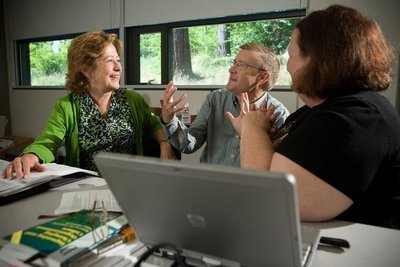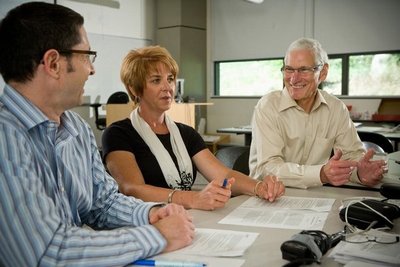November 10, 2010
Preparing multi-skilled future principals at UW Bothell
Students in UW Bothell’s principal preparation program tend to be teachers who already have spent several years as leaders and mentors — even if some of that work is on the informal side.
It’s one of the ways the new program is designed to accommodate busy teachers who have the ambition to become principals.
The program, called Leadership Development for Educators, or LEDE for short, started in spring and will produce its first graduates in June of 2011. Its students will earn a master’s degree as well as the credentials necessary to be a school principal in Washington state. The program is co-directed by Brad Portin, who created it in partnership with school leaders. Both are professors of education at UW Bothell.
The program works in partnership with several area school districts as well as the nonprofit Center for Strengthening the Teaching Profession and the UW’s own Center for Educational Leadership. Created to serve busy working professionals, it features Saturday and online classes and combines practical “performance tasks” with online learning and clinical practice.
Portin said coaching and mentoring are at the heart of the program just as they underlie current UW College of Education research and teacher training. Students gain, UW researchers have learned, when powerful teaching is “modeled” by those who really know how. Portin said Bellamy developed the program “around the theory of action that to be a good principal, you have to know how to coach and mentor good teaching practices.”
The economic crunch has eliminated many paid teacher-leader jobs, but not the coaching itself, he said. “There are teacher leaders with designated roles, but more and more, especially during the time of budget cuts, those have been eliminated (from schools),” he said. “But they are continuing to do that work informally, without a title. Some are working in schools in those roles, others from the school district office.”
The UW Bothell program accepts applicants with this less formal leadership experience, and helps them document their work so that it contributes to the masters degree and principal certification.
The program comprises two main parts, which combine for a total of 800 internship hours:
• Part 1 begins with a 2-credit seminar on instructional and personal leadership, then allows students to work at their own pace through a series of “performance tasks” to create a sort of portfolio of their experience related to leadership.
• Part 2, the program’s website states, is a “cohort-based program capstone” combining three seminars with an internship. “The seminars in Part 2 are commuter- and work-friendly,” with a balance of online learning, face-to-face seminars and clinical practice.”
Portin said that in the second half, “We put a really strong emphasis on the development of these instructional leadership roles.” The program, he said, was designed with critiques of more traditional programs in mind, and features “a strong field base and strong emphasis on performance tasks rather than on just the completion of courses. …It’s about taking that conceptual knowledge and applying it to their internship practice,” he said.
Students appreciate the program’s practical approach. Anne Reece, a professional development coach for the Seattle Public Schools, said she appreciates that the program “is structured on the assumption that I have already demonstrated a degree of school leadership,” acknowledging this experience “rather than assuming I have none” and allowing her to “build upon areas of need.”
The program also suits her scheduling needs, “in that it can be completed while working full time.”
Portin and Bellamy are proud of the community connections the program has already forged. Its working partners include the Edmonds, Bremerton, Federal Way, Renton, kent, Meridian, Northshore and Lake Washington school districts. “We now have a governing group of nine school districts in the Puget Sound area,” Portin said. “They’re our governing board, and will contribute to our extended faculty.”
Portin stressed that the program is Bellamy’s brainchild, and said he was pleased to join UW Bothell about a year back. “One of the exciting draws was that this programmatically matches what we spent several years studying … which was looking at what’s happening in challenging urban school systems to ensure that all kids have the opportunity to learn.”
Portin summed up saying the Leadership Development for Educators program “is designed around a theory of action with an empirical base to it, and is responsive to concerns and critiques people have had about professional preparation.”
He said, “We give (students) multiple intellectual frameworks for making sense of the messy places that schools are.”
The last word, then, will go to one of those very students.
Holly Stein, a K12 literacy program specialist for the Kent School District, wrote, “The LEDE program allows me to think about leadership with some of the best academic minds while engaging in authentic learning within the context of schools; the program combines theory, research, and on the ground experience.”
Stein added that she chose the program for the caliber of learning: “I wanted a program where I would get the best principal and administrative preparation. Too much is at stake for our students [for me] to do otherwise.”
Learn more about the program online here.


